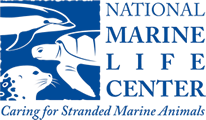Monofilament Recycling Program Underway!

Last week the interns were charged with a new task – emptying the monofilament recycling bins. So far there are two bins in place along the Cape Cod Canal, one near the herring run and the other right behind the National Marine Life Center. The Monofilament Rocovery and Recycling Program (MMRP) is relatively new to Massachusetts, but has been very successful in other states, particularly in Florida where the project was started. Monofilament poses a huge danger to marine and human life when left in the environment.

Monofilament fishing line can injure divers and boaters, foul boat propellers, entangle and poison wildlife, and more. Also, monofilament doesn’t biodegrade – so it can last in the environment for up to 600 years. Because monofilament line is designed to be almost invisible in the water, animals will often swim into it and become entangled, or accidentally swallow it. When an animal becomes entangled, the line cuts through the animal’s skin easily. For many animals, this can mean losing a limb, fin, or a lot of blood. These wounds can also easily contract infections such as gangrene, which can cause them to die rather quickly. If an animal swallows fishing line, the animal may starve to death because it feels full, but isn’t actually getting any nutrients. Not to mention – all of this causes the animals to suffer greatly.

So – what are we doing about it? Some motivated staff members at the National Marine Life Center have been working closely with the Army Corps of Engineers in order to get a branch of the recycling program going here in Massachusetts. The program has spread to 40 counties in Florida. This program also exists in 24 states and 6 other countries around the world.
The long term goals of this program as stated on their website (http://mrrp.myfwc.com/) include:
- Long-term goal 1: Heighten awareness about the negative impacts that fishing line debris has on human welfare, marine life, and water quality.
- Long-term goal 2: Decrease the amount of fishing line entering and remaining in the natural environment.
- Long-term goal 3: Increase the amount of fishing line being recycled.
There are two types of bins in the recycling program – the program’s signature pvc bins placed near popular fishing areas, and indoor cardboard bins that are found inside of supportive organizations – such as the NMLC’s Discovery Center.
When a fisherman is done using his line, he can recycle it in either of these bins. Volunteers, such as the NMLC interns, will collect the line out of the bins, remove any trash and extra debris so that the line is clean when it gets mailed to the recycling company.

The company that recycles the line is called Berkley, located in Spirit Lake, Iowa. Once the volunteers sort and clean the monofilament, it is mailed to the recycling company in postage paid boxes. The line is melted down into raw plastic pellets, these pellets are then made into a number of products such as tackle boxes, spools for line, fish habitats and toys. Unfortunately, only monofilament is currently recyclable. Braided line or line with wire in it is unusable. If you use this type of line, you should cut it down into small pieces and throw it in the trash.
Recycling fishing line is an important step to being a responsible fisherman. There are other ways to help, too! When fishing, recover your line whenever possible. If you find other monofilament, please pick it up and dispose of it properly. Also, do what you can to “be line conscious.” Be wise about using your line – don’t use line that is likely to break because of its age or weakness. When you go out fishing – be sure to have a specified container to put your loose monofilament in.

Something I noticed as I was researching for this blog is that Nebraska doesn’t currently have a monofilament recycling program. I know a number of people who would be interested in getting involved -sounds like Brie has a project for the fall!
All of my information was taken from two websites, so if you’d like to check my facts or do a little perusing for yourself go to:
http://mrrp.myfwc.com/
www.volusiafishinglinerecycling.org
